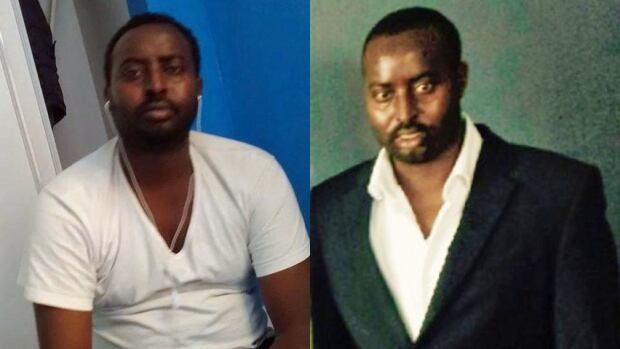A Family's Misfortune
"You can't go against five cops at once. It was unnecessary."
"[There was blood] all over the place He looked weird -- he looked dead. It was weird that they didn't [immediately] call paramedics. It took way too long. Everything was moving very slowly."
Asli Mohamed, 20, Hintonburg area, Ottawa
"I told the police he's a crazy man. They hit, they hit, they hit, they hit everywhere. Then he was unconscious. Then I was scared. Then I'm shocked."
"It's the first time in my whole life I see a human being hit by another human being. He's usually fine [the victim']. I don't understand."
Zainab Abdallah, building resident, neighbour
"I think we're all just surprised because we live in Ottawa and we don't really encounter these kinds of problems."
"I wanted to give the benefit of the doubt, but the way that the situation played out it seemed like it was because we were like immigrants or we were black."
"[The Somali community were not being treated] the way we were supposed to [not] being cared for the way [they] were supposed to [that Sunday morning]."
Mariam Ali, 18, University of Ottawa student
 Abdirahman Abdi, 37, was a Somali-Canadian
with mental health issues, whose family moved to Canada eight years ago.
He was pronounced dead Monday afternoon after losing vital signs during
a confrontation with police on Sunday morning. (Images supplied by
family)
Abdirahman Abdi, 37, was a Somali-Canadian
with mental health issues, whose family moved to Canada eight years ago.
He was pronounced dead Monday afternoon after losing vital signs during
a confrontation with police on Sunday morning. (Images supplied by
family) "Sometimes police have a perceived notion of what a person is doing, or what will happen. They don't always have all the facts. They have only seconds to make an assessment. They are operating on the best information they have at the time."
"You could get two or three psychiatrists to sit there, and they would disagree about the diagnosis [mental state of a suspect]. Then you have a young officer with three years' experience [on the job] with only seconds to react [to an ongoing situation]."
"Police have one main objective: compliance. Stop what you're doing, or come with me. People are shocked when police use force. But police have to do what the law compels them to do."
"There is such a range of possible situations. All situations are so complex [police training cannot possibly encompass all potential situations and the best-case reactions]. You can't give them recipes You can't give them formulas. It's really about observation and focusing on the risk of harm, not doing a diagnosis."
"We don't ask police to do a diagnosis on the scene. You don't want police to assess if someone is mentally ill -- are they delusional? Are they schizophrenic? Are they under the influence? You want police to focus on the behaviour."
Rick Parent, 30-year police officer, professor of criminology, Simon Fraser University

Const. Dave Weir, left, and Const. Daniel Montsion,
centre, are seen kneeling by Abdirahman Abdi outside his apartment
building on Hilda Street. CBC News has learned both officers are the
subject of an SIU investigation into Abdi's death. (YouTube)
When police arrived the man fled, despite being told to stop, and a foot chase ensued. A relatively short one, given the short distance between the cafe and the apartment block. Witnesses described the fleeing man being tackled, brought to the ground by several police officers who proceeded, they said, to kick, punch and beat the subdued man with their batons. He was handcuffed, and lay there, bleeding on the sidewalk.
It took ten minutes, said the onlookers, before the injured man was taken in hand by paramedics and given medical attention. Someone had recorded a 27-minute video which clearly shows the man, wrists cuffed behind his back, trousers pulled down, lying face down for close to ten minutes before the arrival of paramedics and CPR was started. A later news report indicated that the two police officers had been instructed by whoever took their 911 call to initiate CPR; when paramedics arrived they took over.
Witnesses also said that police made an effort to seize cellphones held by bystanders, recording the event. Zainab Abdallah, a resident of the building where Abdirahman Abdi's family also lived watched him run toward the apartment door, the officers in close pursuit, shouting at him to stop. Failure to comply saw him tackled and taken to the ground. When the man was taken to hospital by paramedics, his condition was grave. There were rumours that air had been cut off to his brain.
Despite emergency application by medical personnel at the hospital the man did not survive the physical ordeal and trauma he had suffered. His family is devastated and desolate. They had arrived from Somalia as refugees to Canada in 2009. Both parents have steady jobs. Their oldest son was known to have mental incapacity. In most situations Canada will not permit immigrants to bring in family members who suffer chronic illness of any kind.
The cruel irony, of course, is that refugees who flee violence in their home countries to find haven in other countries, sometimes find instead of a peaceful future, a future cut short by a horrible misadventure of some kind, not necessarily of their own making. It might also be noted that young men from the Somali community are over-represented in proportion to their numbers, in incidents of criminal activity and violence.
The police officers involved in this unfortunate incident with its dreadful outcome are under suspension, while the oversight body that is brought in to investigate when incidents such as this occur, the Special Investigations Unit, is set to launch a probe. Whatever the probe comes up with, the details that have so far emerged do not look very complimentary to these members of the Ottawa Police Force.
Labels: Canada, Misfortune, Refugees

0 Comments:
Post a Comment
<< Home